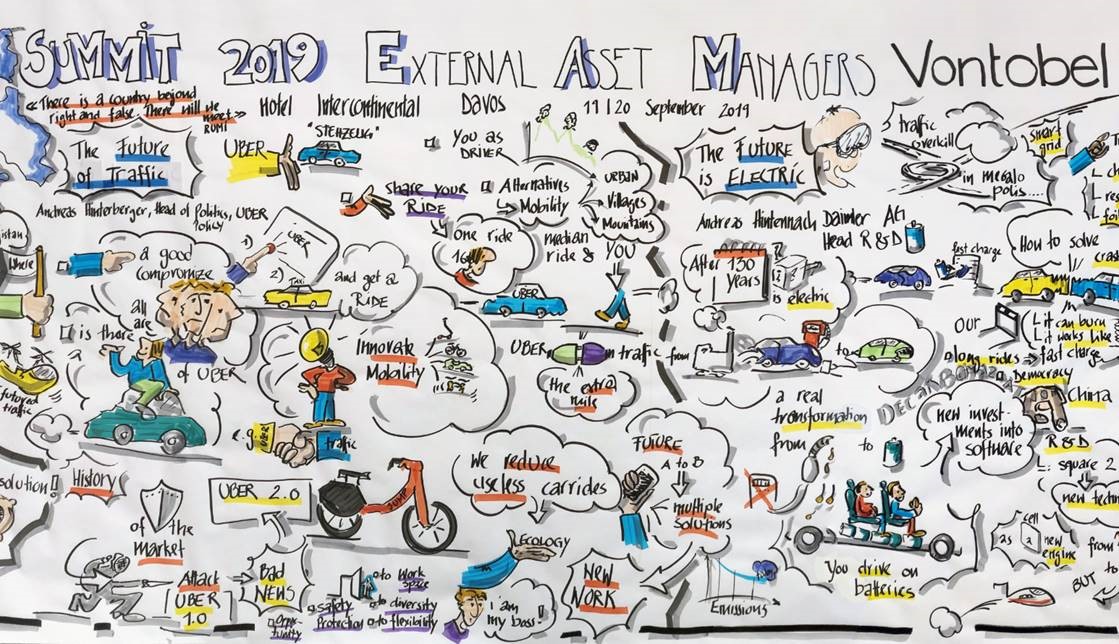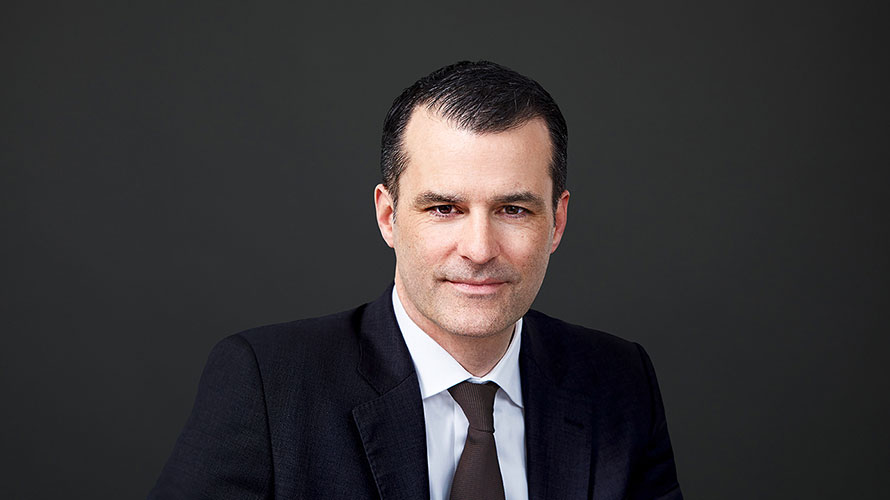Brian Fischer
Head Vontobel Platforms and Services
- Telefono:
- +41 58 283 63 21


Self-flying drones for commuting or intelligent concept vehicles for smart cities: this year's EAM Summit was all about the mobility of the future. From 19 to 21 September 2019, Bank Vontobel invited visitors to the summit meeting under the motto "Connecting Investing Competences". 100 external asset managers attended the conference in Davos.
But the Vontobel EAM Summit 2019 was not just a look into the future. It also dealt with the challenges of the present, particularly in the political context: Brexit, Switzerland's relationship with the EU, and the trade dispute between China and the USA occupied the participants. Read here which topics were of particular interest:
Brian Fischer, Vontobel
The EAM Summit is more than just a specialist congress for external asset managers, explains Brian Fischer, Head of EAM at Vontobel, in his opening speech on Thursday morning. "The external asset managers brought together here from Switzerland and from overseas, represent dozens of billions of assets under management and thus a strong voice in business and politics".
Valentin Vogt, Swiss Employers Association / Burckhardt Compression
At the beginning of the conference, we welcome a guest who is one of Switzerland's most important stakeholders: Valentin Vogt is President of the Swiss Employers' Association and a thoroughbred entrepreneur. "Every third Swiss franc is earned in exchange with the EU," he explains, warning that Switzerland must not miss out on this opportunity in the coming years. In the future, we will face many economic policy challenges that Switzerland alone can hardly master: Brexit, the slowdown in the economy and the trade dispute between the USA and China are examples Vogt cites.
Andreas Hinterberger, UBER
The next programme item is devoted entirely to the mobility of the future. Andreas Hinterberger, head of politics for Switzerland and Austria at UBER, states: "There is too much traffic jam in Switzerland". This is why efficient and cost-effective mobility will be needed in the future. His vision for the future: The user states in an app that he wants to move from A to B. "There is too much congestion in Switzerland. The most efficient variant is proposed. This can be a mix of car, public transport or even an autonomous drone. In order to guarantee this, modern society must abandon ideological trench warfare."
Andreas Hintennach, Daimler
Andreas Hintennach, Head of Battery Research at Daimler, provides a journey into the future of electromobility. For him, one thing is certain: over the next two decades, the automotive industry will be decarbonized. Thanks to increasingly efficient car batteries, the switch from internal combustion engines to electrically powered vehicles is a "done deal". What does this mean for investors? As yet, hardly anyone earns money from the battery business, says Hintennach, since the economies of scale were not right. With modern technology, however, this will change in just a few years.
Frank Rinderknecht, Rinspeed AG
Frank Rinderknecht, founder and CEO of Rinspeed, presents a futuristic vehicle concept: "Snap" is a self-propelled vehicle system that has a modular structure and can be transformed. Individual requirements are thus taken into account. Rinderknecht does not believe in a uniform mobility that applies to everyone. Everyone has their own mobility needs.
Philipp Hildebrand, BlackRock
We hear rather cautious sounds from Philipp Hildebrand, Vice-President of BlackRock and former Chairman of the Swiss National Bank. We are currently in the transition from a bipolar to a multipolar world order, said Hildebrand in the panel discussion with Vontobel CEO Zeno Staub. The USA has less power, politics influences the economy more than ever. But money and state currencies will not disappear. According to Hildebrand, Libra, for example, is more like the Paypal payment system than the Swiss franc. The first day of the EAM Summit 2019 ends with the following words of Hildebrand: "We live in a very dangerous and disruptive world".
Frank Häusler, Vontobel
Frank Häusler opens the second day of the Summit with a positive note: "Economically, 2019 has been a phenomenal year so far," says Vontobel's chief strategist. The next year is more likely to be problematic. Even if a recession in the USA is rather unlikely and the Chinese economy continues to grow, there will be a problem child called Europe in 2020. Nevertheless, he sees the glass half full: "The economy is growing more slowly, but it is growing". And a recession could be ruled out for us in the next 18 months.
Ferdinand Dudenhöffer, University of Duisburg-Essen
According to Ferdinand Dudenhöffer, Professor of Automotive Economics at the University of Duisburg-Essen, the automotive industry has long been in recession. This is mainly due to US tariffs. European automakers would be well advised to concentrate on the Asian markets, especially China.
Raffaello D'Andrea, ETH Zurich
A wow effect is provided by the finale of the conference: Raffaello D'Andrea, Professor at ETH Zurich. He looks back on the beginning of his research with an intelligent robot driven by algorithms in the form of a cube, the later use of which, for example in space travel, was initially unclear. The situation is similar with D'Andreas's research in three-dimensional space: Drones can already play ball - what purpose will these flying robots have in the future? Raffaelo D'Andrea's startup KIVA Systems was acquired by Amazon in 2012. More than 100,000 autonomous mobile robots are now deployed in Amazon warehouses. The engineer and entrepreneur concludes the EAM Summit 2019 with the following closing statement: "Be prepared for the unexpected!"
